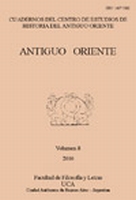Por favor, use este identificador para citar o enlazar este ítem:
https://repositorio.uca.edu.ar/handle/123456789/6755| Título: | Sources of contention and the emerging reality concerning Qohelet's Carpe Diem advice Fuentes de contención y la realidad emergente relación con el consejo de Qohelet acerca de Carpe Diem |
Autor: | Kelly, Joseph Ryan | Palabras clave: | ECLESIASTES; ORIENTE ANTIGUO; POEMA DE GILGAMESH; LITERATURA ANTIGUA; LITERATURA MESOPOTAMICA | Fecha de publicación: | 2010 | Editorial: | Pontificia Universidad Católica Argentina. Facultad de Filosofía y Letras. Departamento de Historia. Centro de Estudios de Historia del Antiguo Oriente | Cita: | Kelly, J. R. Sources of contention and the emerging reality concerning Qohelet's Carpe Diem advice [en línea]. Antiguo Oriente: Cuadernos del Centro de Estudios de Historia del Antiguo Oriente. 2010, 8 Disponible en: https://repositorio.uca.edu.ar/handle/123456789/6755 | Resumen: | Abstract: When Qohelet declares “there is nothing new under the sun,” his own words are no exception. It has been known for a century now that not all of Qohelet’s material is original to his own genius, and the idea that Qohelet is directly dependent on a literary source(s) is standard fare. The hallmark example continues to be Siduri the alewife’s advice to Gilgamesh which displays remarkable correspondence with Ecclesiastes 9: 7-9. However, what may have been construed as an instance of clear literary dependency a century ago cannot be maintained in light of the data that continues to emerge from the ancient Near East. New sources have risen that contend with the Gilgamesh Epic, and there has yet to emerge a definitive victor. This paper calls into question the very idea that Qohelet was directly dependent on a literary precursor and joins with a few select voices both past and present in suggesting an alternate interpretation of the data. Resumen: Cuando Qohelet declara “no hay nada nuevo bajo el sol”, sus propias palabras no son una excepción. Se sabe desde hace un siglo que no todo el material de Qohelet es original del autor, y es una suposición común la idea de que Qohelet depende directamente de una fuente(s) literaria. El ejemplo distintivo sigue siendo el consejo de la tabernera Siduri a Gilgamesh, el cual demuestra una importante correspondencia con Eclesiastés 9: 7-9. Sin embargo, lo que hace un siglo podría haberse interpretado como una instancia de clara dependencia literaria, ya no puede sostenerse a la luz de los datos que continúan emergiendo acerca del antiguo Cercano Oriente. Nuevas fuentes han aparecido que lidian con el poema de Gilgamesh, y todavía no ha surgido una propuesta definitiva. Este trabajo pone en tela de juicio la idea de que Qohelet dependía directamente de un precursor literario y se une a un grupo selecto de voces del pasado y del presente al proponer una interpretación alternativa de los datos. |
URI: | https://repositorio.uca.edu.ar/handle/123456789/6755 | ISSN: | 1667-9202 | Disciplina: | ARQUEOLOGIA | Derechos: | Acceso Abierto | Fuente: | Antiguo Oriente: Cuadernos del Centro de Estudios de Historia del Antiguo Oriente. 2010, 8 |
| Aparece en las colecciones: | AO - 2010 vol. 8 |
Ficheros en este ítem:
| Fichero | Descripción | Tamaño | Formato | |
|---|---|---|---|---|
| sources-contention-emerging-reality-qohelet.pdf | 197,69 kB | Adobe PDF |  Visualizar/Abrir |
Visualizaciones de página(s)
142
comprobado en 30-abr-2024
Descarga(s)
93
comprobado en 30-abr-2024
Google ScholarTM
Ver en Google Scholar
Este ítem está sujeto a una Licencia Creative Commons

